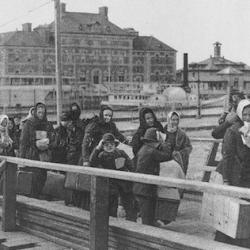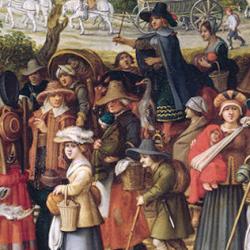The paragraphs below are taken, with slight changes, from a column I wrote at Firstthings.com in July 2015. The questions are even more pressing since Trump’s election.
Immigration has always roiled under the surface of American politics. It’s the price of being America, a land subdued by outcasts and transplants, first from Western Europe, then from the world. Every fresh wave of immigrants is an American identity crisis. Are we a Protestant nation, or can we make room for Irish Papists? Are we European, or are we commodious enough for Indians and Chinese? Are we English-speaking, or are the polyglot sidewalks of midtown Manhattan as essential to the glory of America as Midwestern farm towns?
We have not always welcomed the huddled masses, but have zagged from comparative openness to restriction to selective exclusion before zigging back. Immigration was never wholly unregulated. Even before it was federalized, states imposed limits on entry. With the “Chinese Exclusion Act” of 1882, the federal government took control of immigration, and it used its power in part to preserve the nation’s racial, ethnic, linguistic, and religious purity. When the Act was contested, the Supreme Court upheld the “plenary power” of Congress to control immigration and expel unassimilable groups. Quotas favoring Europeans followed, then a policy focused on reuniting families, now a mashup policy attempting to meet the conflicting demands of market regulation, anti-terror security, family unity, and generosity, all without breaking the bank of the welfare state.
G. K. Chesterton said that America is a nation with the soul of a church, and our Pentecostal population is among the most obvious proofs. Yet here more than anywhere else, the Church’s polity clashes with American polity. When we follow the guidance of our Scriptures, Christians don’t have the luxury of ambivalence, much less hostility, toward immigrants. On the assumption that strangers would move into Israel, Torah exhorts the Hebrews to treat strangers with justice, mindful that they had been strangers in Egypt. Torah’s hospitality is fulfilled in Paul’s declaration that in Christ there is neither Jew nor Greek, slave nor free, native-born or foreign-born. . . .
Trump’s candidacy [and now Presidency] has been buoyed by Evangelicals, who display a typically American ambivalence about outsiders. Evangelical support Trump might be evidence of a compartmentalization of political and religious convictions, or it might be a symptom of a deeper pathology. Trump’s bombast has sparked an identity crisis not only for the nation but also for the Church. While he forces Americans to ask, “Is America a nation with the soul of a church?” the question he puts to Christians is more probing: “Are we a church with the soul of America?”











